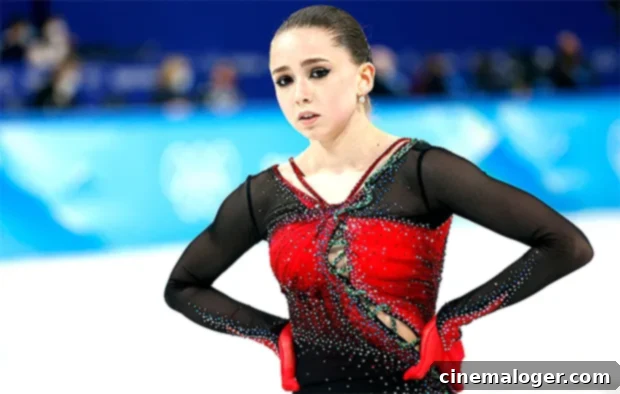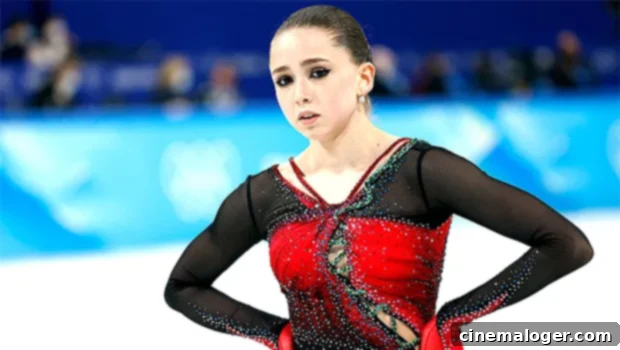Kamila Valieva Doping Controversy: Tara Lipinski & Johnny Weir React to Figure Skater Missing Olympic Medal
The 2022 Winter Olympics in Beijing delivered an unprecedented level of drama and controversy, particularly in the women’s figure skating event. At the heart of this storm was 15-year-old Russian Olympic Committee (ROC) skater, Kamila Valieva, whose participation was clouded by a positive doping test. The palpable tension surrounding her free skate performance on February 17th culminated in a surprising outcome: Valieva failed to secure a medal, a development that brought an audible sigh of relief from U.S. Olympians and highly respected NBC Sports commentators, Tara Lipinski and Johnny Weir.
As the events unfolded, the relief expressed by Tara Lipinski, 39, and Johnny Weir, 37, was palpable and immediately broadcast to millions of viewers. Their reactions highlighted the deep ethical concerns that had plagued the figure skating competition for days. Valieva, a prodigious talent widely considered a gold medal favorite, finished in fourth place, a result that allowed the traditional Olympic podium ceremony to proceed without the shadow of a doping scandal.
The moment Valieva’s fourth-place finish was confirmed, a wave of relief washed over the commentary booth. Co-commentator Terry Gannon announced, “There will be a gold, silver, and a bronze medal in the women’s event in Beijing.” To this, Johnny Weir, without hesitation, responded with a fervent, “Thank god.” Tara Lipinski echoed his sentiment, adding, “Thank goodness for all the other medalists to have that moment, and to have done it cleanly.” Their words underscored the critical importance of fair play and the integrity of the Olympic Games, principles that many felt had been gravely threatened by Valieva’s continued participation.

The Doping Cloud and the Significance of a Clean Podium
The relief expressed by Lipinski and Weir was not merely personal but reflected a broader sentiment among athletes, officials, and fans worldwide. Had Kamila Valieva placed in the top three, a medal ceremony for the women’s singles event would have been postponed or even canceled due to the ongoing investigation into her doping violation. This unprecedented situation would have cast a further pall over the entire Olympic Games, diminishing the achievements of other deserving athletes.
Ultimately, the gold medal went to Valieva’s ROC teammate, Anna Shcherbakova, who delivered a spectacular performance. Another ROC skater, Alexandra Trusova, earned the silver medal, making history with her ambitious quad-heavy program. The bronze medal was claimed by Japan’s Kaori Sakamoto, who skated beautifully and cleanly, securing her country’s first Olympic medal in women’s singles figure skating since 2010. Her placement was particularly significant, as she edged out Valieva, whose performance was marred by several uncharacteristic stumbles and falls. The emotional toll of the situation was evident, as the young Russian skater was seen sobbing inconsolably after her scores were announced, a poignant image that captured the heartbreak and controversy of the moment.
BREAKING NEWS
3:11 CET
now 3.20KAMILA VALIEVA IN DISTRESS AS SHE STUMBLES SEVERAL TIMES & FALLS ON THE ICE
(4th. Place award) pic.twitter.com/RAGWk4ab8i— Patrick Emek (@14wombat1) February 17, 2022
Lipinski & Weir: Vocal Critics and Concerned Mentors
The commentary from Johnny Weir and Tara Lipinski, both former Olympians and esteemed figure skaters themselves, provided a crucial lens through which the global audience viewed the unfolding drama. Their outspokenness on the doping scandal, particularly concerning a minor athlete, resonated deeply. Even before Valieva took to the ice for her free skate, they voiced significant concerns, not just about the integrity of the sport but also about the well-being of the young skater.
Tara Lipinski, an Olympic gold medalist herself, expressed her profound frustration and anger: “I can’t imagine how tough this has been on Kamila and it makes me angry that the adults around her weren’t able to make better decisions and guide her and be there for her because she’s the one now dealing with the consequences and she’s just 15 and that’s not fair.” This powerful statement highlighted the ethical dilemma surrounding Valieva’s situation, shifting some of the blame from the athlete herself to her coaching staff and support network. Lipinski’s words acknowledged Valieva’s youth and vulnerability, emphasizing the responsibility of those entrusted with her care.
During Valieva’s fourth-place routine, the seasoned commentators maintained an unusual silence, offering minimal analysis of her technical elements. This choice was a stark departure from their usual effusive and detailed commentary, signaling their discomfort with the circumstances. Aside from basic observations about her jumps, their quiet disapproval spoke volumes. Following her performance, Johnny Weir broke the silence with a concise yet impactful observation: “Most mistakes I’ve ever seen Kamila make in a free skate.” This statement, coming from a peer who had watched Valieva dominate the sport, underlined the immense pressure she was under, whether from the doping scandal, the global scrutiny, or both.
Weir continued to share his raw emotions after the event. He posted a video on Twitter, describing the women’s free skate as “the most bizarre and heartbreaking event” he had ever witnessed in his extensive career in figure skating. “I hope it’s never repeated,” he added, conveying a profound wish for the sport to move beyond such controversies and return to a focus on pure athletic achievement and fair competition.
Thank you. 🤍 pic.twitter.com/0G4tr9g6DY
— Johnny Weir (@JohnnyGWeir) February 17, 2022
The Precedent of Silence and Outrage
The commentators’ muted reaction during Valieva’s free skate was not an isolated incident. They had adopted a similar approach during her short program performance just days earlier, on February 15th, when she shockingly received the top score despite the ongoing scandal. Johnny Weir’s laconic summary after her short program – “All I feel I can say is that was the short program of Kamila Valieva at the Olympics” – perfectly captured the awkward and unprecedented nature of the situation. Tara Lipinski, not one to mince words, reiterated her fury over the scandal: “She had a positive test. We should not have seen this skate.” Her direct condemnation reflected a widespread sentiment that an athlete with a pending doping case should not have been allowed to compete, regardless of any interim legal rulings.
The Doping Scandal: Details and Legal Ramifications
The core of the controversy stemmed from Kamila Valieva’s positive test for Trimetazidine, a banned metabolic agent. The sample was reportedly collected on December 25, 2021, but the positive result was not confirmed by a Swedish laboratory until February 8, 2022, during the Beijing Olympics. This significant delay in reporting the result complicated matters immensely, as Valieva had already competed in the team event, helping the ROC secure a gold medal.
Trimetazidine is classified as a “hormone and metabolic modulator” by the World Anti-Doping Agency (WADA) and is typically used to treat angina. It can enhance endurance and increase blood flow efficiency, making it a performance-enhancing drug in athletic contexts. The presence of such a substance in a 15-year-old athlete’s system raised serious questions about her entourage and potential systemic doping practices within the Russian sports system, a concern that has historically plagued the nation’s Olympic participation.
Despite the positive test, the Court of Arbitration for Sport (CAS) controversially cleared Valieva to continue competing in the individual event. The CAS ruling, made just days before her short program, cited several factors, including her status as a “protected person” under WADA rules due to her age, the “serious issues of unfairness” that would arise if she were denied the opportunity to compete without a full hearing, and the irreparable harm that a provisional suspension could cause her. This decision, while legally nuanced, sparked outrage globally, with many accusing sports authorities of applying a double standard. Critics highlighted the case of U.S. sprinter Sha’Carri Richardson, who was banned from the Tokyo Olympics for cannabis use – a substance far less associated with performance enhancement – arguing for inconsistency in anti-doping enforcement.
The anger and frustration were not limited to commentators. Other former U.S. figure skaters, including Olympic medalist Adam Rippon and Olympian Mirai Nagasu, publicly expressed their outrage over Valieva’s participation in Beijing. Their solidarity with the principle of clean sport and fair competition underscored the widespread dissatisfaction with the CAS decision and the perceived compromise of Olympic integrity. Rippon, known for his candid remarks, articulated the feelings of many athletes who felt that the sanctity of the Games was being eroded.
Beyond Beijing: The Future of Figure Skating and Anti-Doping
The Kamila Valieva doping scandal will undoubtedly cast a long shadow over the 2022 Winter Olympics and the sport of figure skating for years to come. It brought to the forefront critical questions about athlete welfare, particularly for minors in high-pressure sports environments, and the effectiveness of current anti-doping protocols. The incident also reignited debates about the Russian Olympic Committee’s compliance with anti-doping rules, given past state-sponsored doping controversies that led to Russia competing under a neutral flag.
The International Skating Union (ISU) and WADA are facing immense pressure to re-evaluate their policies concerning “protected persons” and the timeline for processing doping samples. Ensuring that young athletes are truly protected, both from exploitation and from the consequences of adults’ actions, is paramount. Furthermore, the incident serves as a stark reminder of the fragile balance between competitive excellence and ethical conduct in elite sports. The call for greater transparency, stricter enforcement, and swifter justice in doping cases will only grow louder as the sports world grapples with the fallout from this unprecedented Olympic drama.
Ultimately, while Valieva’s failure to medal in her free skate offered a temporary resolution to the immediate podium dilemma, the broader implications of her doping scandal will continue to be debated and addressed. The voices of commentators like Tara Lipinski and Johnny Weir, along with the unified stance of athletes advocating for clean sport, served as a powerful reminder of what the Olympic spirit truly represents: fair competition, integrity, and the celebration of human excellence achieved through honest effort.
USA Figure Skating Team: Meet The Athletes Competing in Beijing
